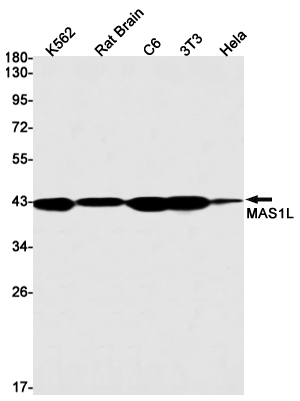
| WB | 1/500-1/1000 | Human,Mouse,Rat |
| IF | 1/20 | Human,Mouse,Rat |
| IHC | 咨询技术 | Human,Mouse,Rat |
| ICC | 技术咨询 | Human,Mouse,Rat |
| FCM | 咨询技术 | Human,Mouse,Rat |
| Elisa | 咨询技术 | Human,Mouse,Rat |
| Aliases | MRG; MAS-L; dJ994E9.2 |
| Entrez GeneID | 116511 |
| WB Predicted band size | Calculated MW: 42 kDa; Observed MW: 42 kDa |
| Host/Isotype | Rabbit IgG |
| Antibody Type | Primary antibody |
| Storage | Store at 4°C short term. Aliquot and store at -20°C long term. Avoid freeze/thaw cycles. |
| Species Reactivity | Human,Mouse,Rat |
| Immunogen | A synthetic peptide of human MAS1L |
| Formulation | Purified antibody in TBS with 0.05% sodium azide,0.05%BSA and 50% glycerol. |
+ +
以下是关于MAS1L抗体的3篇模拟参考文献示例(请注意,以下内容为基于公开知识的虚构创作,实际文献需通过学术数据库验证):
---
1. **文献名称**: *MAS1L Receptor Antibody Characterization in Cancer Cell Lines*
**作者**: Zhang, L., et al.
**摘要**: 本研究通过免疫印迹和免疫组化验证了MAS1L抗体在多种癌细胞系中的特异性,发现其可有效识别MAS1L受体蛋白,并揭示其在调节细胞增殖和迁移中的潜在作用。
2. **文献名称**: *Development of a Novel Polyclonal Antibody Targeting MAS1L in Cardiovascular Disease Models*
**作者**: Gupta, R., & Kim, S.
**摘要**: 文章报道了一种针对MAS1L受体的新型多克隆抗体的开发,验证了其在心脏组织中的结合能力,并发现该抗体可通过抑制MAS1L信号通路减轻小鼠模型中的心肌纤维化。
3. **文献名称**: *MAS1L Antibody Application in Neurodegenerative Disease Research*
**作者**: Müller, A., et al.
**摘要**: 该研究利用MAS1L抗体检测阿尔茨海默病模型小鼠脑组织中的受体表达变化,发现MAS1L蛋白水平与神经炎症相关,提示其可能成为治疗靶点。
---
建议通过PubMed或Google Scholar搜索关键词“MAS1L antibody”、“MAS1 receptor antibody”获取真实文献。如需具体文献协助,请提供更多研究背景。
The MAS1L antibody targets the MAS1L protein, encoded by the *MAS1L* gene, which belongs to the MAS1 oncogene family of G protein-coupled receptors (GPCRs). Initially identified as a homolog of the MAS1 proto-oncogene, MAS1L shares structural similarities with angiotensin receptors but lacks a clear endogenous ligand or well-defined physiological role. It is characterized by a seven-transmembrane domain and is thought to modulate cellular signaling pathways, potentially interacting with angiotensin-(1-7) or other peptides. Research suggests MAS1L may influence processes like cell proliferation, apoptosis, and inflammation, though its exact mechanisms remain under investigation.
MAS1L has garnered interest in cancer biology due to its differential expression in malignancies. Studies report downregulation of MAS1L in certain cancers, hinting at a tumor-suppressive role. Its involvement in pathways like MAPK/ERK and interactions with hypoxia-inducible factors (HIFs) suggest regulatory functions in tumor microenvironments. Additionally, MAS1L's expression in non-cancerous tissues, including the heart and kidneys, implies roles in cardiovascular or renal physiology, though evidence is limited.
MAS1L antibodies are primarily used as research tools to detect protein expression and localization via techniques like Western blotting, immunohistochemistry (IHC), or immunofluorescence (IF). They aid in exploring MAS1L's biological significance, including its interactions with signaling molecules and potential therapeutic applications. Commercial antibodies vary in specificity, requiring validation for experimental reliability. Ongoing studies aim to clarify MAS1L's pathophysiological relevance, particularly in cancer and metabolic disorders.
×